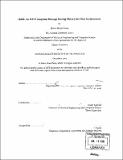rMPI : an MPI-compliant message passing library for tiled architectures
Author(s)
Psota, James Ryan
DownloadFull printable version (12.10Mb)
Alternative title
MPI-compliant message passing library for tiled architectures
Other Contributors
Massachusetts Institute of Technology. Dept. of Electrical Engineering and Computer Science.
Advisor
Anant Agarwal.
Terms of use
Metadata
Show full item recordAbstract
Next-generation microprocessors will increasingly rely on parallelism, as opposed to frequency scaling, for improvements in performance. Microprocessor designers are attaining such parallelism by placing multiple processing cores on a single piece of silicon. As the architecture of modern computer systems evolves from single monolithic cores to multiple cores, its programming models continue to evolve. Programming parallel computer systems has historically been quite challenging because the programmer must orchestrate both computation and communication. A number of different models have evolved to help the programmer with this arduous task, from standardized shared memory and message passing application programming interfaces, to automatically parallelizing compilers that attempt to achieve performance and correctness similar to that of hand-coded programs. One of the most widely used standard programming interfaces is the Message Passing Interface (MPI). This thesis contributes rMPI, a robust, deadlock-free, high performance design and implementation of MPI for the Raw tiled architecture. (cont.) rMPIs design constitutes the marriage of the MPI interface and the Raw system, allowing programmers to employ a well understood programming model to a novel high performance parallel computer. rMPI introduces robust, deadlock-free, and high-performance mechanisms to program Raw; offers an interface to Raw that is compatible with current MPI software; gives programmers already familiar with MPI an easy interface with which to program Raw; and gives programmers fine-grain control over their programs when trusting automatic parallelization tools is not desirable. Experimental evaluations show that the resulting library has relatively low overhead, scales well with increasing message sizes for a number of collective algorithms, and enables respectable speedups for real applications.
Description
Thesis (S.M.)--Massachusetts Institute of Technology, Dept. of Electrical Engineering and Computer Science, February 2006. Includes bibliographical references (leaves 113-115).
Date issued
2006Department
Massachusetts Institute of Technology. Department of Electrical Engineering and Computer SciencePublisher
Massachusetts Institute of Technology
Keywords
Electrical Engineering and Computer Science.